09/10/2024 | GIMI Alumni Spotlight: Peter and Betty Chege – An Amazing Journey of Transformation at Woodvale Farm, Kenya
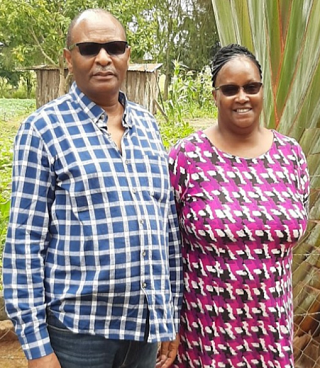
In the heart of Nyeri County, Kenya, overlooking the majestic Mt Kenya and Aberdare ranges, lies a testament to the power of education, determination, and cultural heritage.
Woodvale Farm, owned and managed by GIMI alumni Peter Chege wa Njoroge and his wife Betty, has blossomed from a barren ten-acre farm into a thriving agricultural paradise over the past 16 years.
The Birth of a Dream
Woodvale Farm's story is deeply rooted in the rich cultural traditions of the Kikuyu community. As Peter explains, "In my Kikuyu community culture, an individual must have an urban and a rural identity in terms of owning property. A rural-based farm is considered the final destination for people in their sunset days post-retirement."
This cultural philosophy of "dual identity" was the driving force behind the acquisition of Woodvale Farm in February 2007. The land, when first purchased, was a far cry from its current state. "The land was open, flat, dry and barren with only one acacia tree," Peter recalls, painting a vivid picture of the challenges that lay ahead.
For Peter, who came from a humble, landless background, acquiring this land was more than just a cultural obligation-it was a strategic move to break free from the chains of poverty he experienced from his childhood days in Londiani, Kipkelion in Kericho County. "Coming from a very humble, landless and poor family background, I was determined to free myself from the shackles of poverty," he shares. "Owning agricultural land was the initial strategy in breaking the poverty chains."
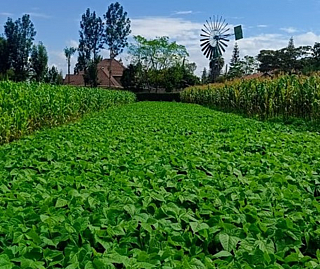
The GIMI Influence
The transformation of Woodvale Farm from a dry, barren land to a flourishing agricultural enterprise is deeply rooted in Peter's experiences in Israel, beginning with his military training in 2007.
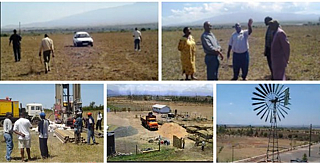
During this time, Peter was profoundly impacted by the Israeli agricultural landscape. "I was inspired to see how dry land could produce compared to what wet and fertile land in my country could not produce on the same size of land," he recalls. This eye-opening experience, which included visits to kibbutzim and GIMI, sparked a determination in Peter to learn more about innovative farming techniques.
True to his promise, Peter returned to GIMI in 2012 for the Livestock Technology and Farm Management Programme. The two-week course was intensive and practical, featuring field visits to kibbutzim, factories, and research facilities. Impressed by the programme, Betty followed in Peter's footsteps, completing the same course in 2013.
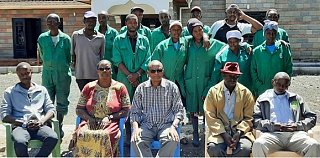
Armed with their newfound knowledge, the couple embarked on a transformative journey at Woodvale Farm in 2014. "Our combined experience at GIMI was a force multiplier in terms of farm design and management skills," Peter explains. They embraced the philosophy that "there is no land that is too small, too dry, too bad, or too remote." It is not the size of land that matters, but rather a combination of many variables including physical space utilization, embracing scientific and corporate principles of management. This mindset, coupled with the innovative techniques and management strategies they acquired at GIMI, became the driving force behind Woodvale's success.
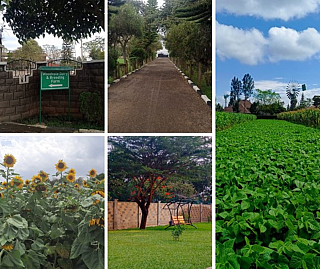
A Model of Sustainable Success
Today, despite its relatively small size, Woodvale stands as "an environmental paradise and among the best managed small-scale farms in Nyeri County," according to Peter. It serves as a GIMI-inspired model of agricultural excellence where every square inch of land is accounted for in terms of utility and production.
The once-barren land now boasts multiple income streams, including dairy farming and breeding, an orchard, poultry, Dorper sheep rearing, fish farming, and an upcoming livestock semen centre and apiary.
The farm's transformation extends beyond its productive capacity. An elegant Woodvale arboretum, featuring a diverse canopy of indigenous and exotic trees, has created a microclimate and a mini ecosystem, further enhancing the farm's environmental value.
Sustainable practices learned at GIMI have been implemented throughout the farm. Drip irrigation, strategic fodder growth management, and water conservation techniques are just a few examples of how Woodvale maximises efficiency while minimising environmental impact.
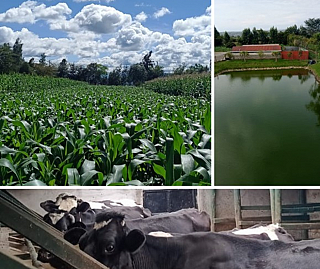
However, the journey hasn't been without its challenges. Peter and Betty have faced harsh weather conditions and fluctuating market prices for milk and farm produce, which have impacted the farm's income. Drawing on their GIMI training, they implemented innovative solutions to overcome these obstacles. "Through the use of irrigation, solar and windmill powered borehole water, a water storage dam stocked with fish, afforestation and mixed farming are some of the mitigation strategies," Peter explains. These adaptive measures have not only helped stabilise farm income but also contributed to the overall sustainability of Woodvale Farm.
“There is power in teamwork. I wish to convey many thanks to Ms Betty Chege, my family and the entire Woodvale crew for pulling it off despite the challenges we have gone through together”.
Community Impact and Future Vision
The success of Woodvale Farm ripples out into the local community. Fifteen community members are directly employed at the farm, positively impacting their families' lives, particularly by enabling them to provide education for their children. The farm has become a beacon of inspiration, regularly visited by aspiring farmers looking to replicate its success.
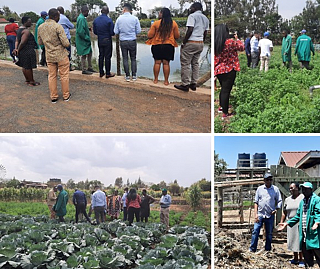
Looking into the future, Peter and Betty have progressive plans for Woodvale. "In the next three years or so, we project the coming to fruition of a solarised farm as the main source of power," Peter shares. They also aim to establish a fully functional semen centre to boost milk production and a Dorper sheep breeding centre to meet traditional Kikuyu dowry demands.
With regard to our achievements, I belief that a concealed success story has no value in life. As the vison carrier for Woodvale Farm, I gladly welcome you to witness a GIMI-inspired miniature model of an agricultural success model-The Woodvale Farm.
A Testament to GIMI's Impact
The story of Woodvale Farm is a powerful testament to the lasting impact of GIMI's training programmes. Peter and Betty's journey from students to successful Agri-entrepreneurs embodies the institute's mission of empowering individuals with practical, innovative knowledge.
Peter concludes with this message, "GIMI, as a multi-skilled training institute, equips graduates with a broad range of expertise to ensure business continuity and diversify income streams. Beyond livestock and farm management training, GIMI prepares its students with essential corporate skills such as business model development, investment strategies, and risk management. This comprehensive approach enables graduates to explore diverse income opportunities and maintain a sustainable business. Woodvale is thus considering other opportunities outside farming."
As we reflect on the remarkable journey of Peter and Betty Chege in Kenya, we at GIMI are filled with pride. Their success story exemplifies the transformative power of education, cultural values, and unwavering determination. Woodvale Farm stands not just as a triumph for the Chege’s family, but as a shining example of sustainable development and the enduring impact of knowledge shared across continents.
The success of GIMI alumni like Peter and Betty reinforces our commitment to providing world-class agricultural education and fostering global partnerships for sustainable development. Their story is a reminder of the far-reaching effects of our collective efforts in shaping a more sustainable and prosperous future for communities around the world.

